Theresa Nguyen
Seeking Late Night Life Lines: Experiences of Conversational AI Use in Mental Health Crisis
Dec 29, 2025Abstract:Online, people often recount their experiences turning to conversational AI agents (e.g., ChatGPT, Claude, Copilot) for mental health support -- going so far as to replace their therapists. These anecdotes suggest that AI agents have great potential to offer accessible mental health support. However, it's unclear how to meet this potential in extreme mental health crisis use cases. In this work, we explore the first-person experience of turning to a conversational AI agent in a mental health crisis. From a testimonial survey (n = 53) of lived experiences, we find that people use AI agents to fill the in-between spaces of human support; they turn to AI due to lack of access to mental health professionals or fears of burdening others. At the same time, our interviews with mental health experts (n = 16) suggest that human-human connection is an essential positive action when managing a mental health crisis. Using the stages of change model, our results suggest that a responsible AI crisis intervention is one that increases the user's preparedness to take a positive action while de-escalating any intended negative action. We discuss the implications of designing conversational AI agents as bridges towards human-human connection rather than ends in themselves.
Facilitating Self-Guided Mental Health Interventions Through Human-Language Model Interaction: A Case Study of Cognitive Restructuring
Oct 24, 2023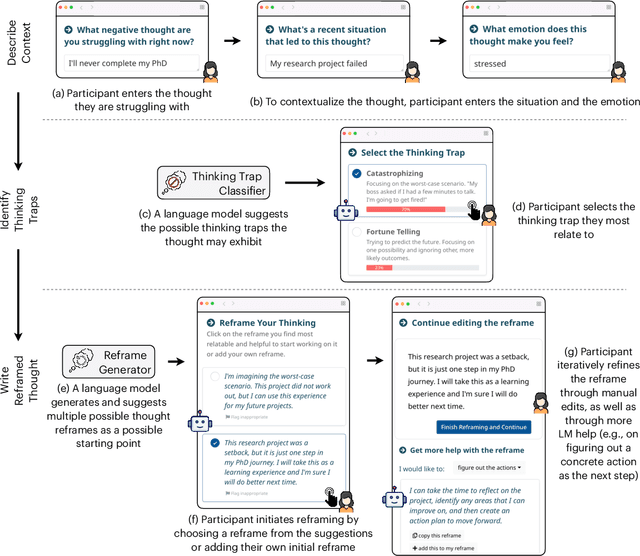
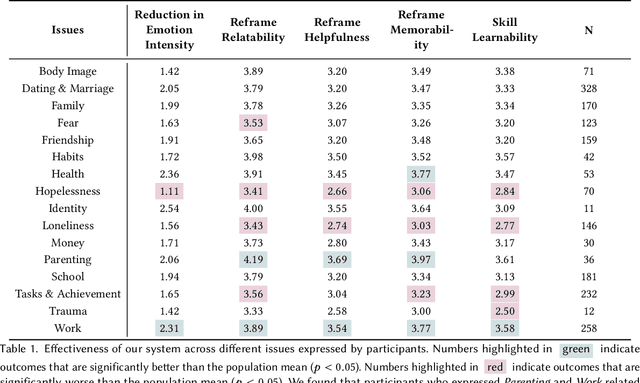
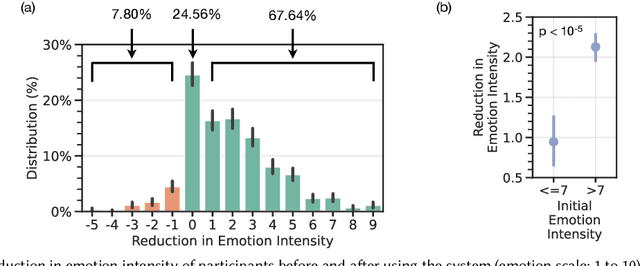
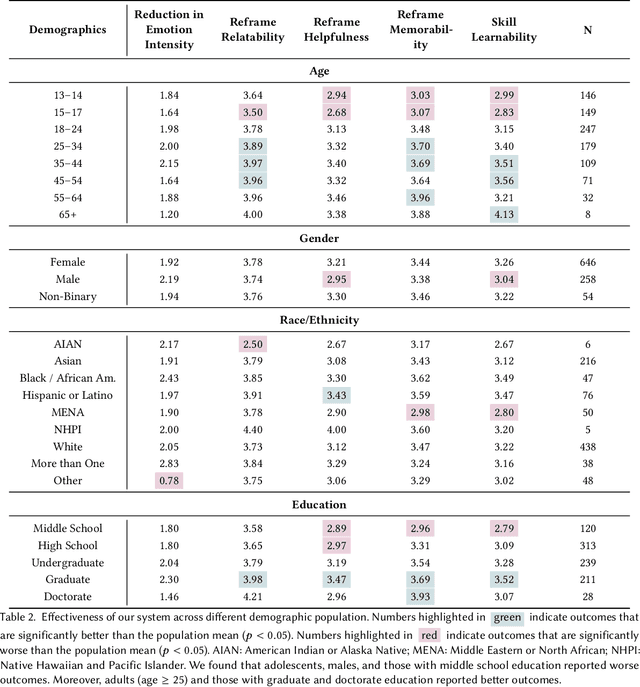
Abstract:Self-guided mental health interventions, such as "do-it-yourself" tools to learn and practice coping strategies, show great promise to improve access to mental health care. However, these interventions are often cognitively demanding and emotionally triggering, creating accessibility barriers that limit their wide-scale implementation and adoption. In this paper, we study how human-language model interaction can support self-guided mental health interventions. We take cognitive restructuring, an evidence-based therapeutic technique to overcome negative thinking, as a case study. In an IRB-approved randomized field study on a large mental health website with 15,531 participants, we design and evaluate a system that uses language models to support people through various steps of cognitive restructuring. Our findings reveal that our system positively impacts emotional intensity for 67% of participants and helps 65% overcome negative thoughts. Although adolescents report relatively worse outcomes, we find that tailored interventions that simplify language model generations improve overall effectiveness and equity.
Using Adaptive Bandit Experiments to Increase and Investigate Engagement in Mental Health
Oct 13, 2023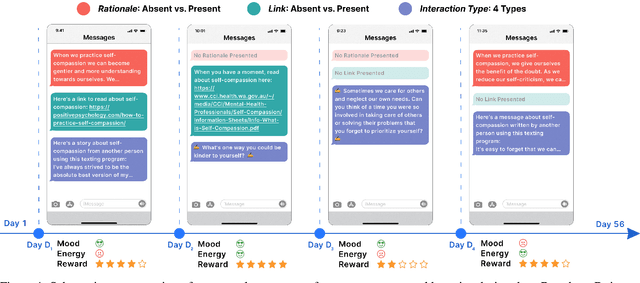
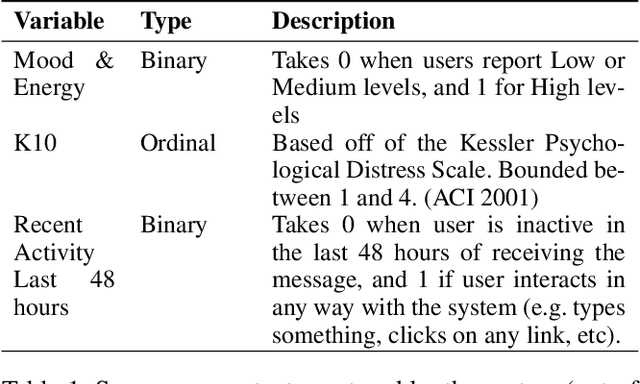
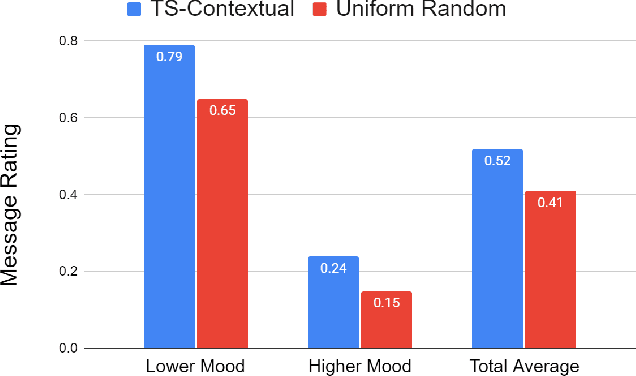

Abstract:Digital mental health (DMH) interventions, such as text-message-based lessons and activities, offer immense potential for accessible mental health support. While these interventions can be effective, real-world experimental testing can further enhance their design and impact. Adaptive experimentation, utilizing algorithms like Thompson Sampling for (contextual) multi-armed bandit (MAB) problems, can lead to continuous improvement and personalization. However, it remains unclear when these algorithms can simultaneously increase user experience rewards and facilitate appropriate data collection for social-behavioral scientists to analyze with sufficient statistical confidence. Although a growing body of research addresses the practical and statistical aspects of MAB and other adaptive algorithms, further exploration is needed to assess their impact across diverse real-world contexts. This paper presents a software system developed over two years that allows text-messaging intervention components to be adapted using bandit and other algorithms while collecting data for side-by-side comparison with traditional uniform random non-adaptive experiments. We evaluate the system by deploying a text-message-based DMH intervention to 1100 users, recruited through a large mental health non-profit organization, and share the path forward for deploying this system at scale. This system not only enables applications in mental health but could also serve as a model testbed for adaptive experimentation algorithms in other domains.
Cognitive Reframing of Negative Thoughts through Human-Language Model Interaction
May 04, 2023



Abstract:A proven therapeutic technique to overcome negative thoughts is to replace them with a more hopeful "reframed thought." Although therapy can help people practice and learn this Cognitive Reframing of Negative Thoughts, clinician shortages and mental health stigma commonly limit people's access to therapy. In this paper, we conduct a human-centered study of how language models may assist people in reframing negative thoughts. Based on psychology literature, we define a framework of seven linguistic attributes that can be used to reframe a thought. We develop automated metrics to measure these attributes and validate them with expert judgements from mental health practitioners. We collect a dataset of 600 situations, thoughts and reframes from practitioners and use it to train a retrieval-enhanced in-context learning model that effectively generates reframed thoughts and controls their linguistic attributes. To investigate what constitutes a "high-quality" reframe, we conduct an IRB-approved randomized field study on a large mental health website with over 2,000 participants. Amongst other findings, we show that people prefer highly empathic or specific reframes, as opposed to reframes that are overly positive. Our findings provide key implications for the use of LMs to assist people in overcoming negative thoughts.
 Add to Chrome
Add to Chrome Add to Firefox
Add to Firefox Add to Edge
Add to Edge